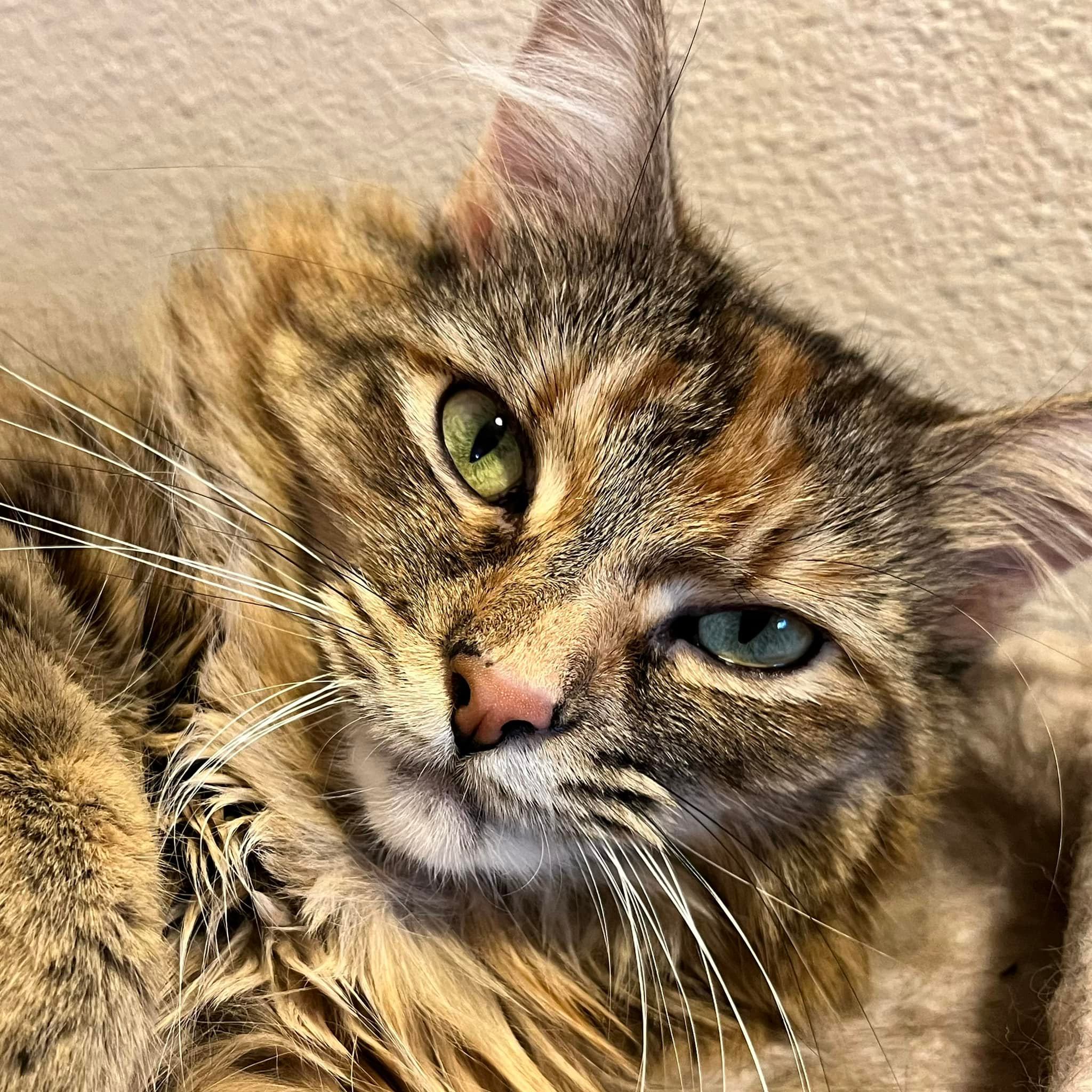
My timeline has been flooded for weeks with ads for the latest invention for dogs—a system that allows owners to set boundaries for the dog, points past which, on their property, they don’t want the dog to go. It works like an “invisible fence” system, but isn’t installed underground or permanently. It uses GPS technology. The owners “drop a pin” on the points they pick, then, automatically, when the dog approaches one of those points, the dog gets a zap from the collar that is the main part of the system. The dog gets a shock.
The ads for these new devices must appeal to lovers of technology. The boundary collar offers owners a “quick and easy” way to keep their dog on their property and away from anywhere they don’t want the dog to go, without effort or attention from the owners themselves.
Has this sort of system, sized appropriately, been invented for cats? If the technology can be monetized, it will be—shock collars for cats have been invented.
I would recommend that you search online for more information on cat boundary collars, if you’re interested, but you might read the reviews and some of them are very sad.
I asked online:
“Animal professionals and animal lovers, please share your immediate reaction and explain why you feel the way you do about the possibility of using a shock collar on your cat.”
Do You Love a Cat? I Have a Few Questions for You
Would you let your cat outside if you knew for sure they’d stay within certain boundaries set by you?
Would you give your cat more freedom inside your house if you could do it without closing doors?
Would you like your indoor cat to stay off the counters, dining table, your desk, or other furniture?
Would you be interested in a device that gives you the ability to mark boundaries for your cat?
Boundaries to keep him where you choose in your yard.
Boundaries to keep her where you choose in your house.
Boundaries to keep them off counters, furniture, laptops . . .
Would you use a shock collar on your cat?
I don’t think you’ll be surprised; their answers are clear: they will not use cat shock collars.

Photo by Mark Cuilla
Cate Wetherald (Washington) No to the collar, but we do use a “shock mat” to keep our big cat from scratching at the bedroom door before dawn. That has been a life changer for us and the cat, which no longer gets yelled at and misted with water. There hasn’t even been a battery in it for over a year and it’s still working. When the door is left open, the cat will sometimes stop to sniff it before jumping over it. The biggie is no more scratching the door. When we first introduced it, he stepped on it and got a slight zap, and that seems to be all it took. He was born in our closet from a neighborhood stray and is a big scaredy-cat.
Desperation was the mother of this purchase. I remember Googling how to stop the behavior and found a few online discussions and someone mentioned using the mat. I read some more reviews and made the purchase. We tried the “sscat by petsafe” too, but it was unreliable. It would make a hissing sound if one of us walked too close to it and sometimes would not make a sound when the cat walked right by it. We named it “The Hisser” and it scared the crap out of me more than once!
Kim Rinehardt (California) A scat mat is not even closely equivalent to a shock collar. First of all, the shock is quite different. The ones that I have come in contact with have delivered the equivalent of a static shock, very much like the ones that happen on a windy day. And a scat mat gives an environmental correction, which is something that happens in life fairly frequently. We may have set up this particular environmental correction, but that doesn’t change the nature of the correction. And they teach the same thing that other environmental corrections teach, which is to avoid the situation. I’m not coming out for or against, simply saying that those two things work very differently.
Manolito Daniel (Washington) My cat has all the freedom that she wants in my house. If I could let her outside I would, but I can’t. A shock collar is one of the most disturbing things I’ve heard. That sounds like an answer for someone who doesn’t know how a cat works and certainly shouldn’t have one. There are distinct feline personality types and I wanted the kind who was up on my furniture, up in my face walking across my keyboard, all in my business. I’m lucky to have her.
Sara Maynard (Trinidad and Tobago) I would never use a shock collar on my cat. I also don’t agree with cats being allowed to roam freely. As much as I love my cats, I also understand that cats are considered to be an invasive species and that, if given the chance, they will kill wildlife. One of my cats is also blind, so for his safety he is not allowed to move around without wearing a harness and lead when outside with me. I have built an outside cattery, which I think gives them the best of both worlds. It keeps birds and other wildlife in my garden safe, and also protects my cats from dogs and other dangers that roaming cats face, while still allowing them to be under the trees and experience the outside world.
Christine Hale Vertucci (Illinois) I don’t currently have a cat, but I lost my 19- and 24-year-old cats in the past year or so. They had free roam of the house but with pet gates to allow them space where the dogs couldn’t reach them. The 19-year-old was allowed outside with us on a harness (which he loved), and the 24-year-old managed to go on two “walk-abouts,” including one when she was 22 while we were on vacation. She did come outside on the deck with us on occasion. Both cats managed to stay off the dining table and counters, although we’d come home and find the older cat on top of the refrigerator occasionally (which impressed us). They were allowed on furniture. When we moved to our new house, we did restrict access for cats and dogs to the formal living room with the use of free-standing and baby gates. We never needed any other method to restrict our cats’ access to anything, so no other methods were needed or utilized. If you ask me the same question re: some of the kittens I’ve fostered, I might answer differently!
Micha Michlewicz (Maryland) No free roaming outside. Wildlife is being decimated by cats. Confined to a leash and harness, or physical enclosure, sure.
Electric-shock fencing is unreliable for their safety and likely to create fear issues.
Yes to more freedom indoors.
No, I wouldn’t care. Except for food surfaces.
No to any devices unless it’s something like a Pet Tutor, which is a remote-controlled treat delivery machine. It has accessory options that can be set up for those devices to signal treat delivery. Basically the opposite of a shock collar in every way. It’s a reward, and it rewards the cat for being in a place that you prefer to the undesirable places.
Colette Kase (Mexico) I do not personally understand giving pets electric shocks as a form of management or control. It’s so far beyond my scope of why I would choose to live with a pet, that I can’t even comprehend how people do it. Cats, like all pets, should be closely supervised when not safely inside their home. An “invisible fence” system does nothing to protect them from predators, other cats, or disease.
Lori Leah Monet DVM (Colorado) Simple answer. No. Have I used them? On dogs years ago. No clue where the collar is now. Did it help? Nope.
My cats get supervised outdoor time on my deck with me, and there are no stairs down. And yet two different ones have either jumped or fallen. I found them, but they no longer get free rein. No, I would never let them roam freely, even if they stayed in bounds, because (see above) they can’t be trusted.
If I had a dog, same rules. No unsupervised freedom.
I have put too many “He NEVER left the yard before” cats and dogs back together after [they’ve] being hit by a car or attacked by that “My dog never bites” neighbor dog.
Cats are no longer “independent” free-living creatures who have jobs controlling rodents. They are companion animals.
PS. I have stood barefoot on a scat mat . . . it tickles.
Olivia McCollum (Washington) As a new kitten mom this year, I am extremely protective of my babies and would not let them outside unless they were on a leash and I could see them. They are completely content inside and are both spayed and neutered. My cats have full access to our apartment, but they are not allowed on the counters. I would NEVER use a shock collar on my kitties. They are extremely smart and a little noise or water squirt does the trick. If you have a strong bond to your cat, you should be able to train without any use of pain or shock.
Carlos Alden (Washington)
1. Yes
2. Yes
3. Ideally, but it’s kinda fun to yell at them
4. Yes, but . . . what?
5. Yes, would love for them to be able to be outside even in a very limited way
6. Yes
7. Ideally
8. Nope
Darcey Byrne (Washington) Absolutely no shock collars.
Colleen McCarvill CPDT-KA (Alberta) NO. Cats are much too vulnerable to other predators. The only way my cats would be outside is if I had a safe enclosure with a lot of enrichment—a catio (coming soon!). My cats are completely free in my house. I don’t love it when my cats walk on my countertops, but we have a really large kitchen with very extensive countertops and [the cats] absolutely love it. I disinfect everything before I start to cook.
Donna-Leigh Rowley (Ontario) Regarding the first question, no, I won’t and I don’t let my cats outside for safety reasons. Even if they knew their “boundaries,” other animals don’t, such as coyotes, raccoons, and so on. They could harm the cat. And as for the shock collar, NO!
Carol Byrnes (Washington) I have a cat that stays in the yard because we built perimeter fencing that contains her so she can enjoy the yard without the dangers of leaving it. And NO, I would never shock my cat.
Inna Krasnovsky (New York) Would you let your cat outside if you knew for sure they’d stay within certain boundaries set by you? Hell To The No. My cats will always be indoor cats. Where they are safe, have plenty of enrichment, and I know where they are at all times. The boundary—if it even works—would not keep other animals out who might attack my cats. Nor would it keep diseases out. A cat can get spooked, run out of the boundary, and get killed by a car or another animal, or be abused by a human. My cats already have all the freedom of the house and I don’t close doors. I have no problems with my cats on furniture, including counters.
Build a catio. That provides a safe, closed-in outdoor space for your cat. If I were to build one, I would also never allow the cats to use it unless I was supervising.
Would you use a shock collar on your cat? Of course NOT.
Jenny Beard Biehunko DVM (Alabama)
1. No. I would still be worried about predators.
2. Sure. But they already have the run of the house.
3. I couldn’t care less. My house is theirs.
4. Not particularly. See above.
5. The thought of using a shock collar on any of my animals—but particularly on my cats—to keep them in an outside boundary that predators could still access, makes me physically ill.
Also, for a variety of reasons, cats are NOT small dogs . . .
They tend to have a much lower limbic-system threshold, as they are small prey animals in addition to being predators. Their natural inclination toward something threatening is to run, hide, and avoid. They tend to take a much longer time to return to homeostasis after a stressful event, and they tend much more toward being one-trial learners with a scary or painful event.
Summer Storm Kingery DVM (North Carolina) Only creature I am willing to use a shock collar on is a fully consenting human adult.
Cat Shock Collar—Are They Safe And Do They Work?
https://www.thehappycatsite.com/cat-shock-collar/



